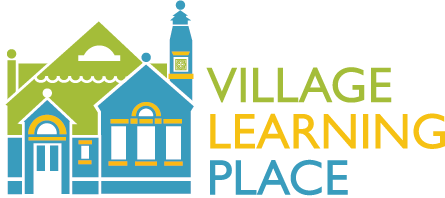Shop Village Learning Place merch!
Baltimore History Evenings
Explore our city's rich past.
Dive into Baltimore’s fascinating history with Baltimore History Evenings, a monthly series of presentations and discussions in partnership with the Baltimore City Historical Society. Held on the third Thursday of each month from January to June at 7:00 pm, this virtual series brings our city’s past to life through engaging talks by local historians, scholars, and experts.
Join us as we explore the stories, events, and people that shaped Baltimore into the vibrant city it is today. From the city’s industrial roots to its cultural milestones, Baltimore History Evenings provides an opportunity to learn, discuss, and connect with fellow history enthusiasts.
Upcoming Baltimore History Evenings
Thursday, January 16, 2025, 7:00-9:00pm
Who has Coal Fever?
The Invisible Violence of the Coal Supply Chain from Extraction to Export, 1970s & 1980s
Presented by Nicole Fabricant
The Port of Baltimore has long been a major exporter of coal, linking the mines of West Virginia to nations across Europe. As the city built its coal export infrastructure in South Baltimore, environmental degradation followed. How did this impact the residents, and how did they fight back?
Nicole Fabricant, professor of anthropology at Towson University, is author of Fighting to Breathe: Race, Toxicity, and the Rise of Youth Activism in Baltimore.
Thursday, February 20, 2025, 7:00-9:00pm
“Losing my Home is Like a Death to Me:”
A Collective Narrative Investigation into the Slow Violence of Urban Renewal
Presented by Nicole King and Sonia Eaddy
The long-stalled redevelopment of the Poppleton neighborhood presents a case study of the harms of urban renewal and the resistance of residents. It also shows how institutions of higher education and communities can work together for change, and how public history and historic preservation can be used in the fight against displacement.
Nicole King is associate professor of American Studies and co-directs the Orser Center for Public Humanities at UMBC. Sonia Eaddy, a fourth-generation Poppleton resident, is president of the Poppleton NOW! neighborhood association.
Thursday, March 20, 2025, 7:00-9:00pm
The Wilkens Curled Hair Factory:
The Rise and Fall of a Major Baltimore Industry
Presented by Jillian Storms, AIA, and Jerome Gray, AIA
In the 1840s, German-born entrepreneur William Wilkens opened a factory that used animal hair to make products ranging from mattress stuffing to wigs. Employing over 1,000 workers in its heyday, the factory was key to building up southwest Baltimore.
Using rich visual sources, this talk will tell the story of the man, the factory, and the neighborhood.
Architects Jillian Storms and Jerome Gray are former co-chairs of the Baltimore Architecture Foundation’s Dead Architects Society.
Thursday, April 17, 2025, 7:00-9:00pm
Dare to Struggle, Dare to Win:
The Black Panthers and Networks of Political Organizing in Baltimore
Presented by Kristian Whitehead and Gerardo Fontes
This presentation on the Baltimore chapter of the Black Panther Party highlights the influence of Maoism on the chapter’s community service and political activities. It also explores the Panthers’ community and political connections as seen through the group’s relationship with Rev. Chester Wickwire, chaplain emeritus of Johns Hopkins University and prominent civil rights advocate.
Kristian Whitehead is a senior history major at Morgan State University minoring in African American and African Diaspora. Gerardo Fontes is a senior at Johns Hopkins University majoring in international studies, political science, and history.
Thursday, May 15, 2025, 7:00-9:00pm
“The Thing has not Become Known:”
The Desegregation of Hospitals in Baltimore
Presented by Alicia Puglionesi
This talk provides an overview of hospital segregation in Baltimore and describes the process of desegregation initiated by Black physicians and community leaders starting in 1945. Focusing on Johns Hopkins Hospital as an example, it examines how activists navigated both the conservative norms of the medical profession and the special position of hospitals as sites of care.
Alicia Puglionesi is a lecturer in Medicine, Science, and the Humanities at Johns Hopkins University. Her books Common Phantoms and In Whose Ruins deal with relationships between spiritual belief and scientific knowledge.
Thursday, June 19, 2025, 7:00-9:00pm
“I Ask Mercy at Your Hands:”
Henry Alfred Brown, Third-Degree Torture, and Black Grassroots Responses
to Judicial Inequality in 1920s Baltimore
Presented by Michael Casiano
In 1921, Black sailor Henry Alfred Brown was charged with murdering a white nurse in Annapolis. He held steadfast to his innocence until, he alleged, a brutal interrogation by two Baltimore police detectives elicited a confession. This talk investigates one man’s experiences to illuminate structural realities regarding racialized police brutality and the biases of Baltimore’s legal system.
Mike Casiano, assistant professor in American Studies at UMBC, is author of Let Us Alone: The Origins of Baltimore’s Police State, set for release in Fall 2025.
Baltimore History Evenings are sponsored by Trace Architects. “Trace Architects is committed to using architecture as a tool for neighborhood sustainability. We are passionate about our profession and that translates into projects that energize not only the individual but the community.”
Overview
Location
2521 St Paul St, Baltimore, MD 21218, United States of America
Hours
- Mon, Tue, Thu
- -
- Wednesday
- -
- Friday
- Closed
- Saturday
- -
- Sunday
- Closed
The Village Learning Place (VLP) prohibits discrimination in all its programs and activities on the basis of race, color, national origin, age, disability, and where applicable, sex, marital status, familial status, parental status, religion, sexual orientation, genetic information, political beliefs, reprisal, or because all or part of an individual’s income is derived from any public assistance program.
